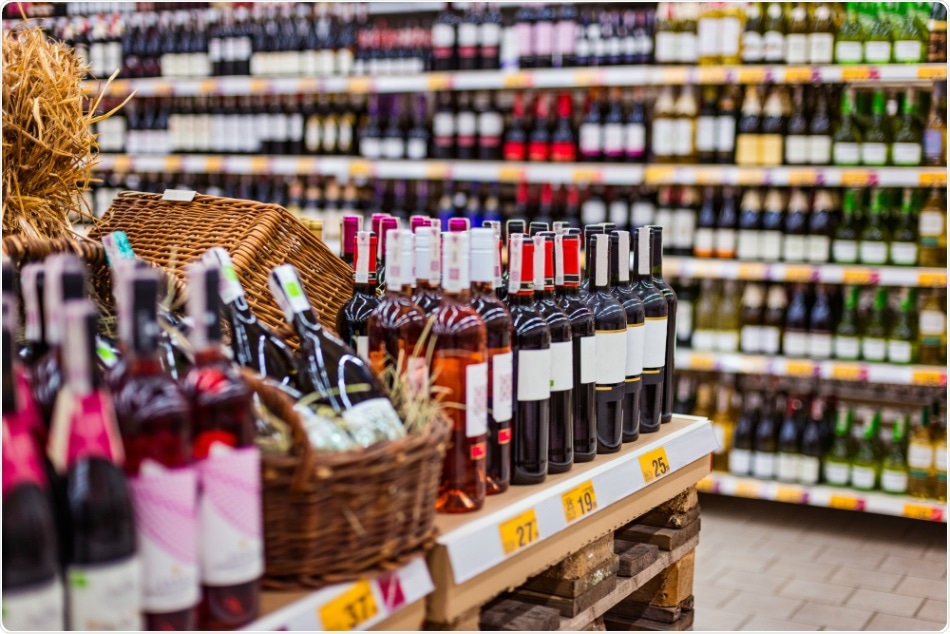Scotland has introduced minimum unit pricing (MUP) of alcohol, which has resulted in a decrease in total alcohol purchased as well as total consumption of alcohol per household, a study has found. The study titled, “Immediate impact of minimum unit pricing on alcohol purchases in Scotland: controlled interrupted time series analysis for 2015-18,” was published in the latest issue of the BMJ this week.
 Daniel Jedzura | Shutterstock
Daniel Jedzura | Shutterstock
Alcohol consumption is associated with several health problems, including obesity, heart and liver disease as well as cancer. Authors wrote, “Alcohol is the seventh leading risk factor for ill health and premature death globally, and causally related to a wide range of acute and chronic health outcomes.”
Introduction of MUP has been a landmark step in the reduction of alcohol consumption.
The only empirical evidence for the impact of minimum prices of alcohol sales so far come from Canadian provinces, which showed that increases in existing minimum prices were associated with reduced alcohol related harm."
BMJ
The results show that this new step “has achieved its ambition to make relatively cheap and strong alcohol less affordable, which in turn should positively impact public health over time.” MUP was first introduced in Scotland in May 2018, making it the first nation to do so. The limit was 50p ($0.62; €0.56) per unit and alcohol could not be sold below this. A glass of wine (around 125 ml) is said to contain 1.5 units of alcohol, which is equivalent to 12 g or 15 ml of alcohol. One unit was said to contain 10 ml/8 g of alcohol, and this usually equals half a pint of beer or cider or 25 ml of spirits.
After introduction of the new policy, the team led by Peter Anderson from Newcastle University went about assessing the effect of MUP on alcohol purchase in Scotland. Their study spanned over eight months since the introduction of the policy. The team looked at the amount of alcohol purchased from various outlets between 2015 and 2018 from 5,325 Scottish households. This information was compared to alcohol purchases of around 54,807 English households. Around 10,040 households were in northern England, so that regions close to the borders could be assessed. The purchase data came from the Kantar Worldpanel’s household shopping panel for 2015-18.
MUP introduction in Scotland led to a price increase of 0.64p per gram or 5.1p per UK unit. This was a 7.9% price hike. This resulted in a reduction of 9.5 g or 1.2 UK units, or a 7.6% reduction in purchases of alcohol per adult per household. The notable reductions were seen in purchase of beer, cider, spirits, high strength ciders and spirits etc.
The rise in price of purchase of alcohol per household was highest among households that were from lower-income groups who were already purchasing large amounts. These households were buying just under £3 per adult per week earlier. This meant that the target population that would buy less alcohol was also the one that was more vulnerable to harm caused by alcohol.
The team wrote, “During 2015-18, 0.29 million separate purchases of alcoholic beverages from 5325 households in Scotland, 2.83 million purchases from 54 807 households in England, and 0.58 million purchases from 10 040 households in northern England were recorded.”
The alcohol purchase recorded was shop purchase and not “on trade” from bars and restaurants. The researchers explained that heavy drinkers were more likely to purchase alcohol from shops than from bars. The researchers added that they did not account for the men who were drinkers and did not have a fixed address.
In terms of immediate impact, the introduction of minimum unit pricing appears to have been successful in reducing the amount of alcohol purchased by households in Scotland. The action was targeted, in that reductions of purchased alcohol only occurred in the households that bought the most alcohol."
BMJ
In an associated editorial in the same issue of the BMJ titled, “Minimum unit pricing for alcohol in Scotland,” authors John Mooney from the University of Sunderland and Eric Carlin from the Royal College of Physicians of Edinburgh write that while MUP is a welcome measure to prevent excessive alcohol consumption, more needs to be done. They added that since alcohol consumption is a major public health problem, multiple policies should be implemented to curb alcohol use.
They wrote, “In 2018, after six years of legal challenges by global alcohol producers, Scotland became the first country in the world to implement a national MUP policy.” They praised the efforts saying that the 7.6% reduction was double of what was expected when the policy came into effect. They indicated that this could mean that the health benefits would also be greater.
Surely it is time to follow Scotland's lead and implement MUP across the rest of the UK. Action is especially pressing for those regions, such as north east England, with comparable levels of harm from alcohol.
BMJ